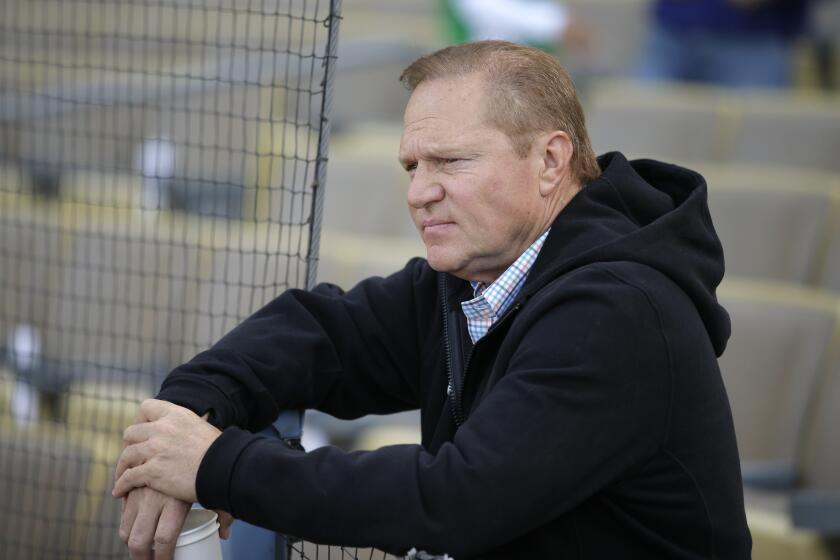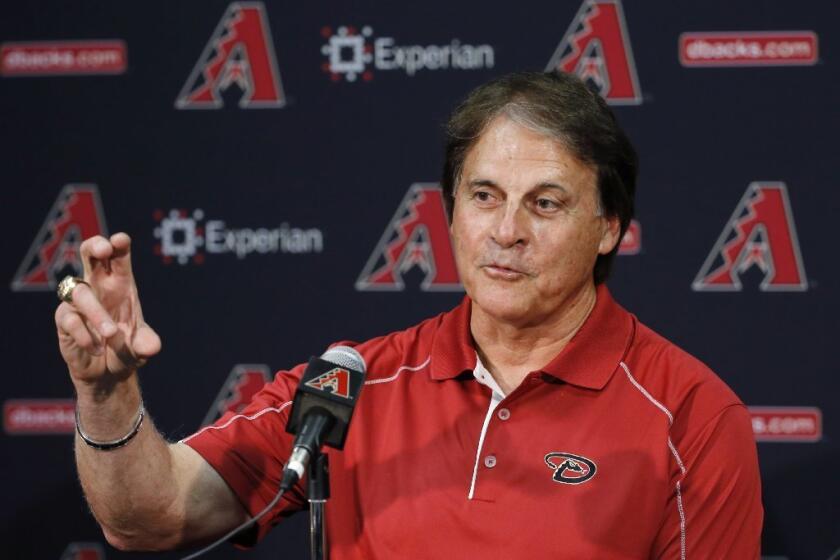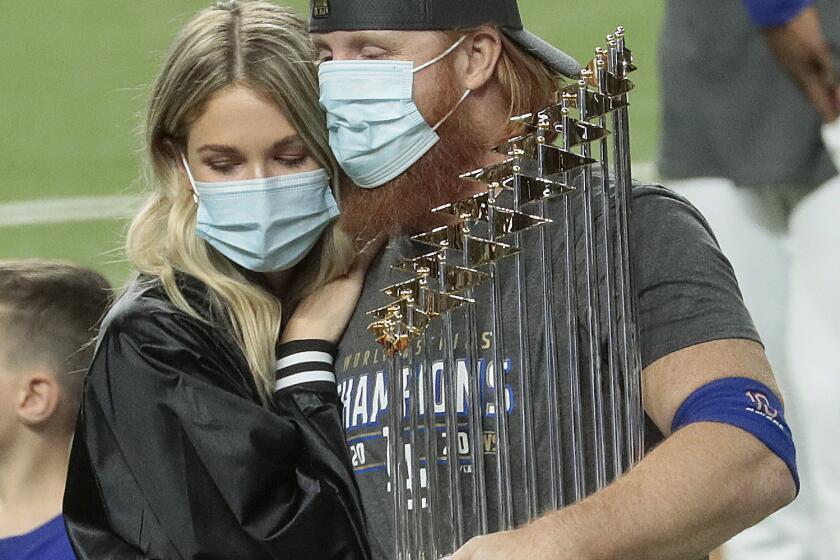From bankruptcy to a World Series title: Dodgers’ ascension is Magic
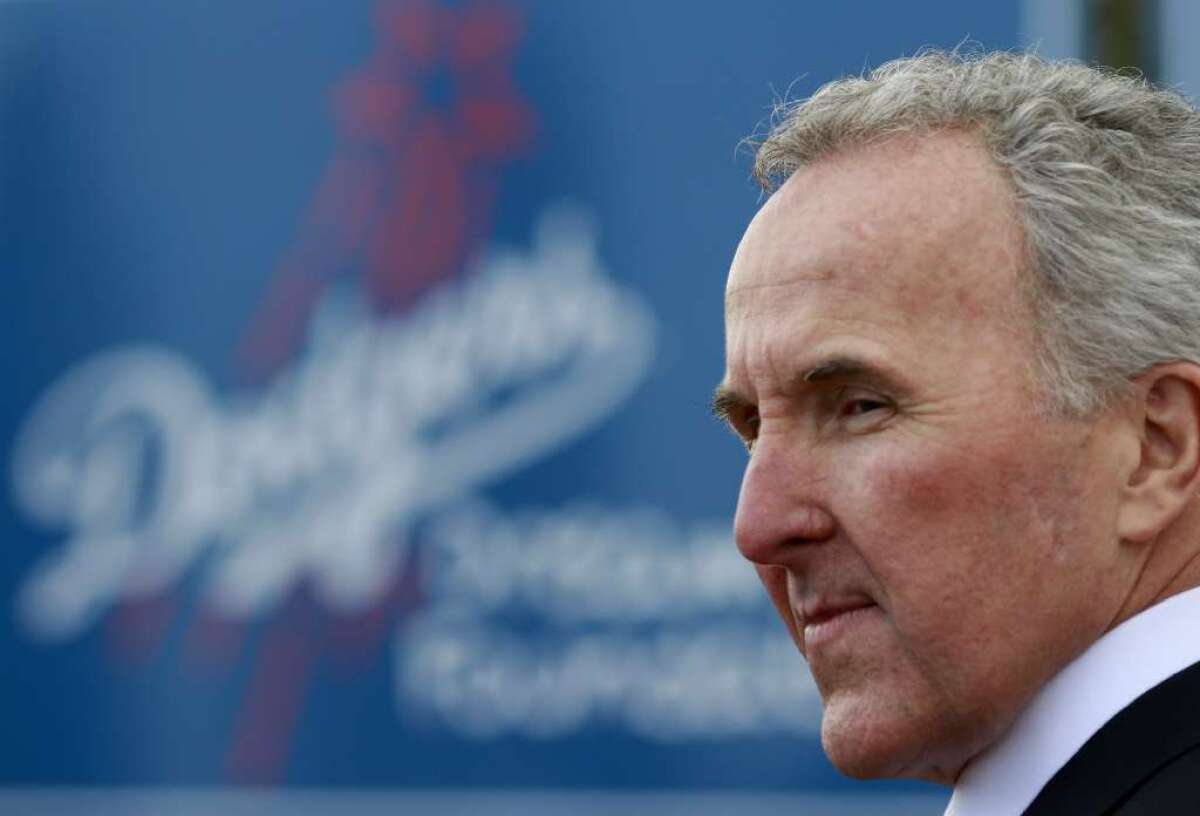
- Share via
October of 2020 will forever be remembered as a golden time in Dodgers history. October of 2010, not so much.
As the San Francisco Giants were on the verge of winning the first of three championships within five years, the Dodgers were imploding. The husband and wife that owned the Dodgers were torching one another in divorce court, flaunting their side-by-side estates and house calls from hairdressers, and holding the team hostage.
Frank McCourt said the team was his. Jamie McCourt said the team was theirs, and she floated the idea of teaming up with a civic hero and trying to buy out her husband.
“I am a baseball fan, a Dodger fan,” Magic Johnson told The Times in October 2010. “But, no, I won’t be buying the Dodgers, or have any talks about owning the Dodgers.”
The World Series trophy has returned to Dodger Stadium. Magic.
Sports agent Scott Boras is a proponent of having the World Series at a neutral site, but players on the Dodgers and Tampa Bay Rays are not fans of it.
Three cheers for Rob Manfred, the commissioner so loudly booed by fans when he awarded the trophy to the Dodgers. Ten years ago, then-commissioner Bud Selig wanted baseball rid of the McCourts, and he told Manfred to figure out how to do it.
The plan: starve McCourt of the television revenue he needed to keep the Dodgers afloat. The team went into bankruptcy, then up for auction, with 13 parties submitting bids.
Mark Cuban bid for the Dodgers. He was a disciplined bidder and he did not value the money-losing team even at $1 billion. The team was sold for $2 billion.
Stan Kroenke bid for the Dodgers. Perhaps, had he won, the Rams still would be in St. Louis, and the Dodgers would be playing in a stadium surrounded by a massive real-estate development — at Dodger Stadium, or in Inglewood.
Jared Kushner bid for the Dodgers. Given what we since have learned about his disdain for proven managerial competence, we’re pretty sure the Dodgers would be languishing in fourth place and he would tell us the team was rounding the corner.
Steve Cohen, approved Friday as the new owner of the New York Mets, bid for the Dodgers. He was the runner-up.
Cohen proposed to hire Tony La Russa as the Dodgers’ president of baseball operations. As a manager, La Russa is a Hall of Famer, as well as the new manager of the Chicago White Sox. In the front office, given La Russa’s disastrous tenure as chief baseball officer of the Arizona Diamondbacks, the Dodgers dodged what might well have been a debacle.
The Angels, seeking a new general manager, say goodbye to Tony La Russa, special advisor to the old GM, who was named manager of the Chicago White Sox.
In his bid for the Dodgers, Cohen partnered with Dr. Patrick Soon-Shiong, now owner of The Times. Cohen believed, quite logically, that a combined $15 billion in net worth would enable him to blow away any other individual bidders.
He was outsmarted and outbid by Mark Walter and his fellow investors, who borrowed from Guggenheim Partners insurance funds to finance the purchase of the Dodgers.
Walter was the money man among the partners, but Johnson was the public face, the one trusted by a generation of Los Angeles sports fans to restore the team to glory. He was not interested in propping up a disgraced owner, as it turned out, but he was more than interested in propping up the Dodgers.
Johnson lit up when he talked about coming to Dodger Stadium back in the day, to watch Dusty Baker and Ron Cey and Steve Garvey, in an era when the Dodgers ruled Los Angeles.
“We want to bring back that Dodger pride,” Johnson said.
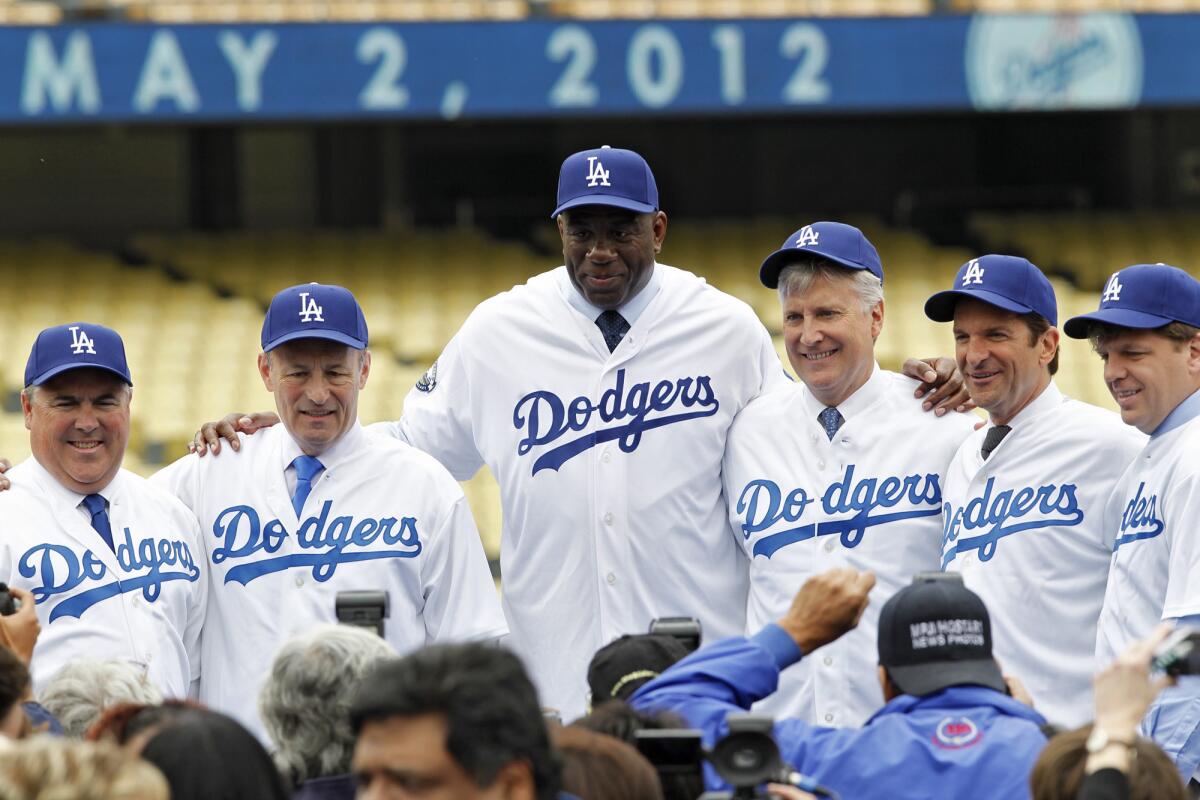
The cheers and fireworks that exploded all over Los Angeles at 8:36 p.m. on Tuesday, Oct. 27 testified to a city bursting with Dodger pride.
At the start of the last decade, the Dodgers had filed for bankruptcy, and Selig had taken over the team. The franchise was in shambles, its owners despised by the fans.
Just look at the Dodgers now: In eight full seasons under Walter and Johnson, the team has won eight division championships, three National League championships, and that long-overdue World Series championship.
The owners made two signature hires. The first was Janet Marie Smith, who ought to become the first ballpark architect inducted into the Hall of Fame. After designing Camden Yards and renovating Fenway Park, Smith made Dodger Stadium into a classic all over again, adding contemporary amenities without sacrificing charm or authenticity.
The second was Andrew Friedman, who shepherded the Dodgers into the modern era of player evaluation and development.
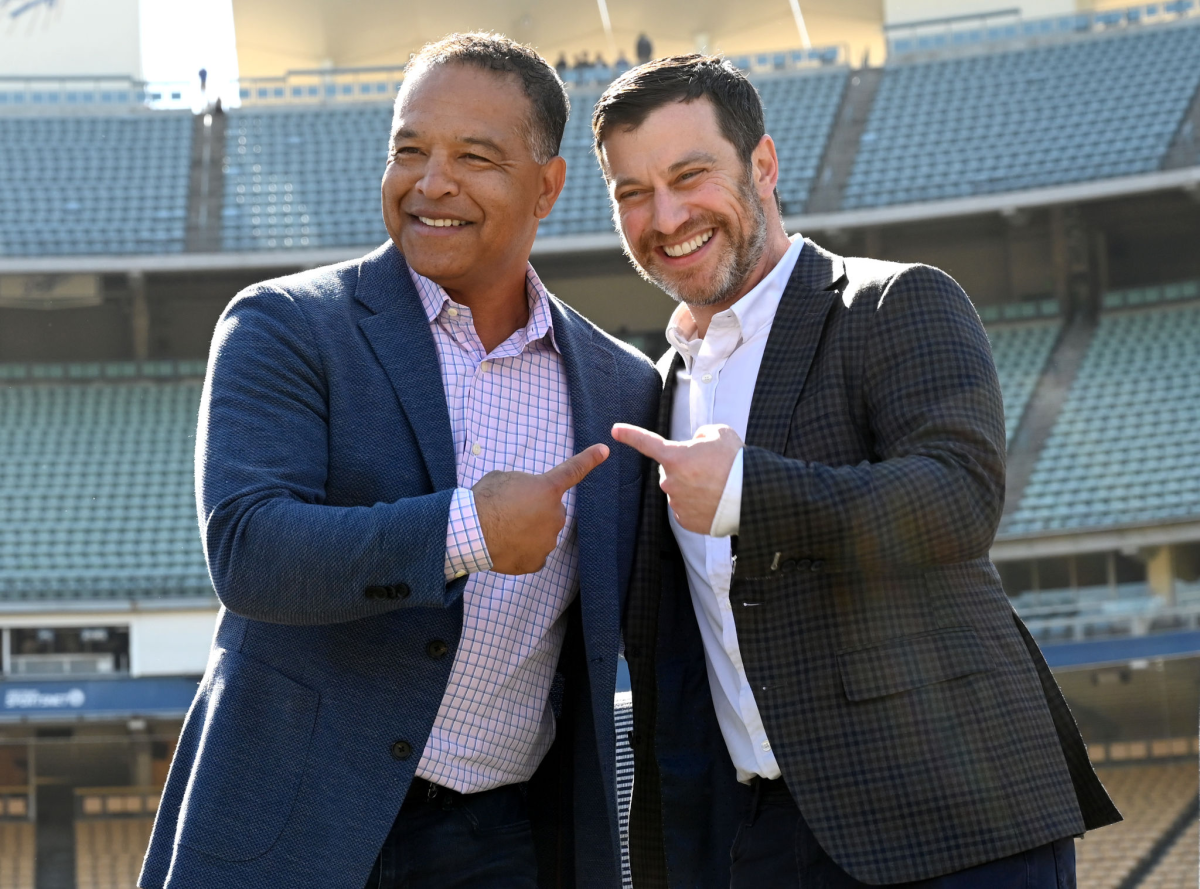
Under Friedman, the Dodgers were less likely to spend that sweet, sweet television revenue on long-term contracts for aging middle relievers and more likely to spend it on player nutrition, extra pitching, hitting and mental skills coaches in the majors and minors, and enough statistical and biomechanical analysts to fill a big league roster.
It is easy to be right when you replace the general manager of a losing team; it is easy to be second-guessed when you replace the general manager of a playoff team. The Dodgers’ owners made the hard move, and the right one.
Johnson made the hard move last year, and the right one, when he realized the Lakers’ management setup was untenable. He bowed out, but not before he had delivered LeBron James.
And, to be fair, Johnson is not involved in the day-to-day operation of the Dodgers. He had delivered hope and faith to the fans when they needed it most, and that was enough.
In the postseason, every play is scrutinized. What if?
What if Justin Turner had launched himself into midair to get one out in Game 7 of the league championship series, but had not the instincts to get two? What if the ball had not caromed off the gloves of two players — Chris Taylor and Will Smith — on the wacky play that won Game 4 of the World Series for Tampa Bay? What if the Rays had not removed Blake Snell while he was throwing a two-hit shutout in Game 6?
Here’s what the science says about whether Justin Turner put other Dodgers at risk by celebrating their World Series win despite a positive coronavirus test.
Well, what if Kroenke, or Kushner, or Cohen had won the bidding for the Dodgers? Walter and Johnson did, and the trophy is ours.
In this year in which so much has gone so wrong, the Lakers and Dodgers won championships 16 days apart. In 1980, when Johnson was a rookie, he replaced an injured Kareem Abdul-Jabbar in the last game of the NBA Finals. Johnson never had played center, but he scored 42 points and the Lakers won.
The memorable headline in The Times the next day still resonates, even more so in this unsettling year: “How else can I explain those rainbows when there isn’t rain? IT’S MAGIC!”
More to Read
Are you a true-blue fan?
Get our Dodgers Dugout newsletter for insights, news and much more.
You may occasionally receive promotional content from the Los Angeles Times.

